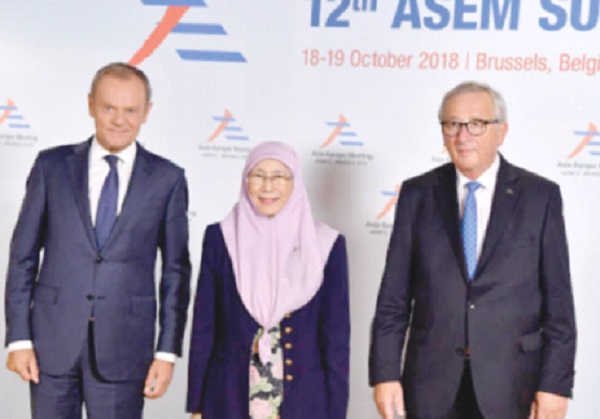Hungary envoy hopeful pca will hasten Malaysia-Eu Fta negotiations
Published on: Friday, December 14, 2018

Kuala Lumpur: KUALA LUMPUR: Hungary hopes next month's signing of the partnership cooperation agreement (PCA) between Malaysia and the European Union (EU) will hasten the Malaysia-EU free trade agreement (FTA) negotiations.Hungary's Ambassador to Malaysia, Attila Kali (pic) said the agreement that would be a key pillar in the bigger framework of Asean-EU FTA, was a big step forward to boost more bilateral and trade agreements between the two regions, specifically with Hungary currently eyeing potential business opportunities in few main areas for its future investments."We are very happy that the Malaysian Government has made such a move, which we believe would be sealed during the upcoming Asean-EU meeting in Brussels in January.
ADVERTISEMENT
"In this context, Hungary (as part of the EU) is really anticipating this and we are very much in favour of the FTA. As Hungary is an export-oriented market economy, hopefully, this (FTA) will happen and certainly, benefits both Hungarian and Malaysian companies."The envoy told Bernama this after delivering a lecture under the Global Dialogue series entitled, 'Hungary - A Dynamic Partner for Malaysia in Central Europe', organised by the Azman Hashim International Business School of Universiti Teknologi Malaysia (UTM) here, recently.The PCA, which was announced by Deputy Prime Minister Datuk Seri Dr Wan Azizah Wan Ismail after meeting Federica Maria Mogherini, High Representative of the EU for Foreign Affairs and Security Policy during the 12th Asia-Europe Meeting (Asem) in October, is a comprehensive agreement on bilateral and multilateral cooperation comprising politics, economics, trade, investment, justice, culture, education, science and technology, healthcare, agriculture, tourism, energy, traffic and environment.As agreed upon, the PCA needs to be first signed by individual Asean members with the EU to qualify for the FTA.
ADVERTISEMENT
To date, the EU already has FTAs with Vietnam and Singapore and is currently negotiating with Indonesia and the Philippines.Malaysia has yet to have an FTA with the EU, as Bernama reported in July this year.
ADVERTISEMENT
Elaborating on the lecture's topic earlier and when asked to describe on how 'dynamic' Hungary could be as compared to other states in the union, Kali said it was highly represented by the country's Gross Domestic Product (GDP) last year."Dynamic, first of all, if you could see the figures of our economic growth of GDP last year, it was recorded at 4.4 per cent. I think it is double the average growth of the EU."While up to September this year, it reached five per cent growth and this (figure) itself indicated how dynamic Hungary is for investment opportunities. As we are also part of central Europe which is globally known as the engine of economy growth in the region, this is one of many reasons why Malaysia should see the business potentials available in Hungary," he reasoned.Kali said as Malaysia had the legal and institutional background which included well-established infrastructures necessary for companies to enter the Asean market, therefore, Malaysia was seen as the 'getaway' for Hungarian business players to tap into."Also because the Hungarian people are very innovative, creative and ready to take the expertise, especially on solutions and technologies, to the world, including Malaysia, we see a very great potential in the Asean market as a whole, and Malaysia as the getaway for us."He said as awareness on Hungary was also important to garner the interests of key business players, the embassy was not only focusing on the activities in the capital city but also in several other states, including Kedah, Perak and the east Malaysian states of Sabah and Sarawak.He noted both nations were currently enjoying bilateral relations, among others, in the field of education, water management and small and medium-sized enterprises (SMEs).Hungary-Malaysia diplomatic relations was established in 1969, with the Malaysian Embassy established in Budapest in 1993.Despite the closure of the Hungarian Embassy in Malaysia in 2009 due to economic crisis, the relations remained via the Hungarian Embassy in Indonesia. In 2015, the Hungarian Embassy here was re-opened.Stay up-to-date by following Daily Express’s Telegram channel.
Daily Express Malaysia




